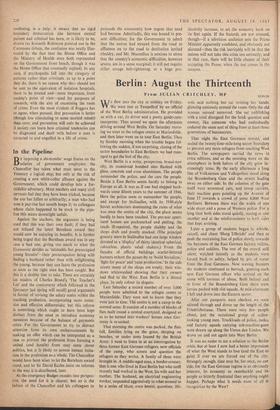Berlin: August the Thirteenth
From JULIAN CRITCHLIFA, MP
RI:R LIN
WE flew into the city at midday on Friday. We were met at Tempelhof by an official of the West Berlin administration. He provided us with a car, its driver and a pretty guide-cum- interpreter. Thus armed we spent the afternoon driving around West Berlin. On Saturday morn- ing we went to the refugee centre at Marienfelde, and then later went on to tour East Berlin. Thus by Sunday morning when the trouble began fol- lowing the sudden, if not surprising, closing of the sector boundaries to East Berliners we had man- aged to get the feel of the city.
West Berlin is a noisy, prosperous, brand-new city, its occasional bombed sites flanked with glass, concrete and even aluminium. The people outnumber the police, and the cars the people. Beside it East Berlin seems hardly to belong to Europe at all. It was as if one had stepped back- wards some fifteen years to the summer of 1946. Here the police seem to outnumber the people, and except for Stalinallee, with its 1930-style Soviet architecture dominating the ruins of what was once the centre, of the city, the place seems hardly to have been touched. The pre-war apart- ment houses are pockmarked and peeling, the roads ill-repaired, the people shabby and the shops drab and poorly stocked. (The principal grocery store in Stalinallee had one large window devoted to a 'display' of thirty identical spherical, colourless, plastic salad shakers.) From the facades of official buildings scarlet-lettered banners exhort the passer-by to 'build Socialism,' light for peace' and 'raise production.' In the side streets many of the shops are empty, their win- dows whitewashed showing that their owners had fled to the West. East Berlin is a dismal place, its only colour its slogans. Last Saturday a record number of over 3,000 people were admitted to the refugee centre at Marienfelde. They were not to know that they were just in time. The centre is not a camp in the normal sense. It consists of a number of•blocks of flats built round a central courtyard, designed so as to be turned into workers' homes once Ger- many is re-united.
That morning the centre was packed, the flats full, families lying on the grass, sleeping on benches, or under tents loaned by the British Army. I went to listen in at an interrogation by three former East German refugees, now officials of the camp, who screen and question the refugees as they arrive. A family of three were brought in. A middle-aged man, a border-crosser, that is one who lived in East Berlin but who until recently had worked in the West, his wife and her mother. The husband, an electrical engineering worker, responded aggressively to what seemed to be a series of blunt, even brutal, questions. His wife said nothing but sat twisting her hands, glancing anxiously around the room. Only the old woman seemed unmoved. She sat unblinking with a total disregard for the brisk question and answer, like someone who had undoubtedly endured the same sort of thing from at least three generations of bureaucrats.
That night the East Germans moved, and sealed the twenty-four-mile-long sector boundary to prevent any more refugees from reaching \Vest Berlin. The newspapers carried the news in extra editions, and as the morning wore on the atmosphere in both halves of the city grew in- creasingly tense. By the early afternoon a long line of Volksarmee and Volkspolizei stood along the Brandenburg Gate and the streets leading away on either side. In the columns of the gate itself were armoured cars, and troop carriers, their machine guns pointing up the Avenue of June 17 towards a crowd of some 8,000 West Berliners. Between them was the width of one wide street and a posse of Western police. For a long time both sides stood quietly, staring at one another and at the reinforcements to both sides that kept arriving.
Later a group of students began to whistle, catcall, and chant 'Hang Ulbricht' and then to push the restraining line of police slowly towards the bayonets of the East German factory militia, police and soldiers. The rest of the crowd, still silent, watched intently as the students were forced back to safety, helped by jets of w ater from the East Germans. Now waving banners the students continued to barrack, greeting each new East German officer who arrived on the scene with torrents of abuse. Both behind and in front of the Brandenburg Gate there were lorries packed with riot squads. At mid-afternoon I left and drove into the Eastern sector.
After our passports were checked we were saluted through and drove up the length of the Friedrichstrasse. There were very few people about, just the occasional group of sullen- looking young men. Truckloads of police, tanks, and factory squads carrying sub-machine-guns were drawn up along the Unten den Linden. We drove on and out again into West Berlin.
It was no easier to see a solution to the Berlin crisis, but at least I now had a better impression of what the West stands to lose (and the East to gain) if ever we are forced out of the city. Strangely enough, time may be, for once, on our side, for the East German regime is so obviously insecure, its economy so ramshackle and its people so bitterly frustrated than anything might happen. Perhaps what it needs most of all is recognition by the West?






























 Previous page
Previous page